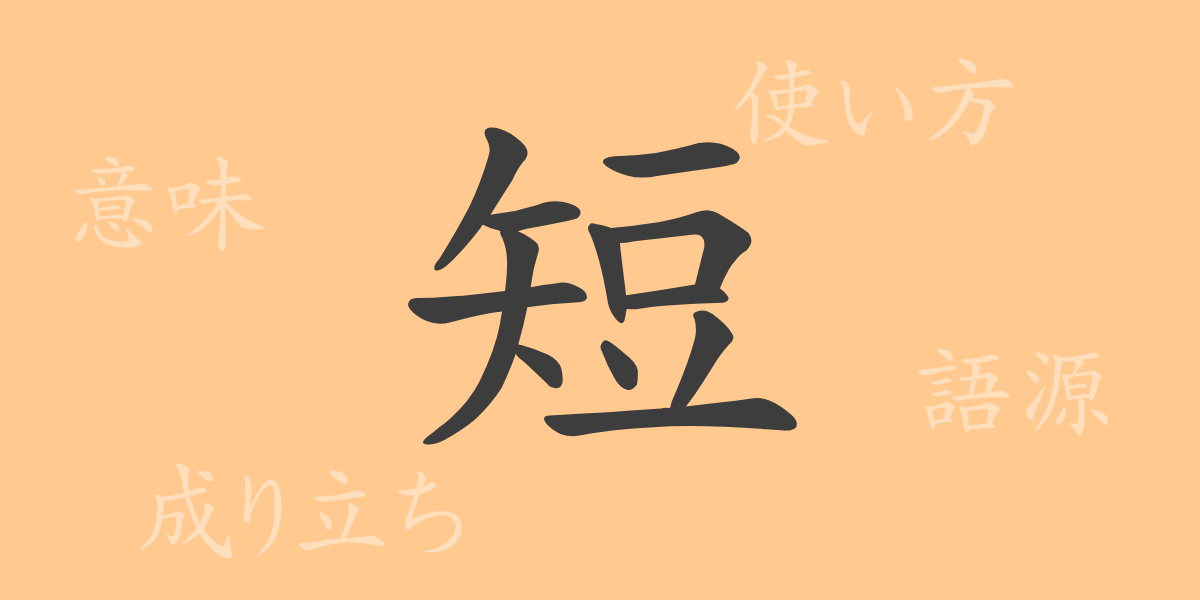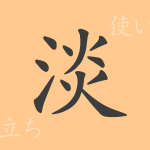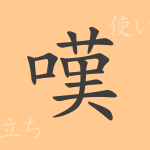The Japanese kanji ‘短’ (タン) (tan) symbolizes the beauty of the Japanese language, containing profound meanings despite its simplicity, playing an indispensable role in our communication. This article delves into the origins, meanings, usages, and expressions associated with ‘短’, exploring the charm of this frequently used character.
Origins of ‘短’ (タン) (tan)
The kanji ‘短’ originated from an ancient Chinese pictograph that depicted a broken arrow, symbolizing ‘shortness’. Initially representing a shortened arrow, it came to signify truncation and brevity. This character, used to describe time and the length of objects, symbolizes conciseness and efficiency.
Meaning and Usage of ‘短’ (タン) (tan)
‘短’ primarily means ‘short’ or ‘insufficient.’ It refers not only to physical length but also to insufficient periods of time or lacking abilities and resources. For instance, ‘短時間’ (たんじかん) (tanjikan) refers to a short time, and ‘短所’ (たんしょ) (tansho) denotes a lack of skills or qualities. Additionally, it is used in the term ‘短絡的’ (たんらくてき) (tanrakuteki), meaning to judge things superficially.
Readings, Stroke Count, and Radical of ‘短’ (タン) (tan)
Understanding the readings and structure of the kanji ‘短’ is crucial for comprehending its meaning:
- Readings: On’yomi ‘タン’ (Tan), Kun’yomi ‘みじか.い’ (mijikai)
- Stroke Count: 12 strokes
- Radical: 矢 (や) (ya), the radical for arrow
Phrases, Proverbs, and Idioms Using ‘短’ (タン) (tan) and Their Meanings
Many idioms and proverbs that include ‘短’ are used in the Japanese language, each carrying significant meanings:
- 短期間 (たんきかん) (tankikan) – Refers to a short period, indicating activities or events completed quickly.
- 短絡的 (たんらくてき) (tanrakuteki) – Describes making quick, often superficial judgments.
- 短所 (たんしょ) (tansho) – Points to a lack or deficiency in someone’s character or abilities.
- 短気は損気 (たんきはそんき) (tanki wa sonki) – A proverb meaning that a quick temper leads to loss, emphasizing the importance of controlling one’s emotions.
Summary on ‘短’ (タン) (tan)
The kanji ‘短’, as indicated by its form, represents brevity or insufficiency. Widely used in everyday life, it reflects the modern society’s appreciation for speed and efficiency. Especially in business contexts where quick results are prized, the meanings embodied by this character are highly valued. ‘短’ also frequently relates to personal traits or abilities, making it a crucial element in communication. Understanding the deep history and culture embedded in each kanji allows us to appreciate the richness of language more profoundly.

























